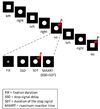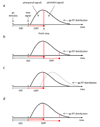Response inhibition in the stop-signal paradigm
- PMID: 18799345
- PMCID: PMC2709177
- DOI: 10.1016/j.tics.2008.07.005
Response inhibition in the stop-signal paradigm
Abstract
Response inhibition is a hallmark of executive control. The concept refers to the suppression of actions that are no longer required or that are inappropriate, which supports flexible and goal-directed behavior in ever-changing environments. The stop-signal paradigm is most suitable for the study of response inhibition in a laboratory setting. The paradigm has become increasingly popular in cognitive psychology, cognitive neuroscience and psychopathology. We review recent findings in the stop-signal literature with the specific aim of demonstrating how each of these different fields contributes to a better understanding of the processes involved in inhibiting a response and monitoring stopping performance, and more generally, discovering how behavior is controlled.
Figures




References
-
- Logan GD. On the ability to inhibit thought and action: A user’s guide to the stop signal paradigm. In: Dagenbach D, Carr TH, editors. Inhibitory processes in attention, memory and language. Academic; 1994.
-
- Logan GD, Cowan WB. On the ability to inhibit thought and action: A theory of an act of control. Psychological Review. 1984;91:295–327. - PubMed
-
- van den Wildenberg WPM, van der Molen MW. Developmental trends in simple and selective inhibition of compatible and incompatible responses. Journal of Experimental Child Psychology. 2004;87:201–220. - PubMed
-
- Williams BR, et al. Development of inhibitory control across the life span. Developmental Psychology. 1999;35:205–213. - PubMed
Publication types
MeSH terms
Grants and funding
LinkOut - more resources
Full Text Sources
Other Literature Sources
Medical

